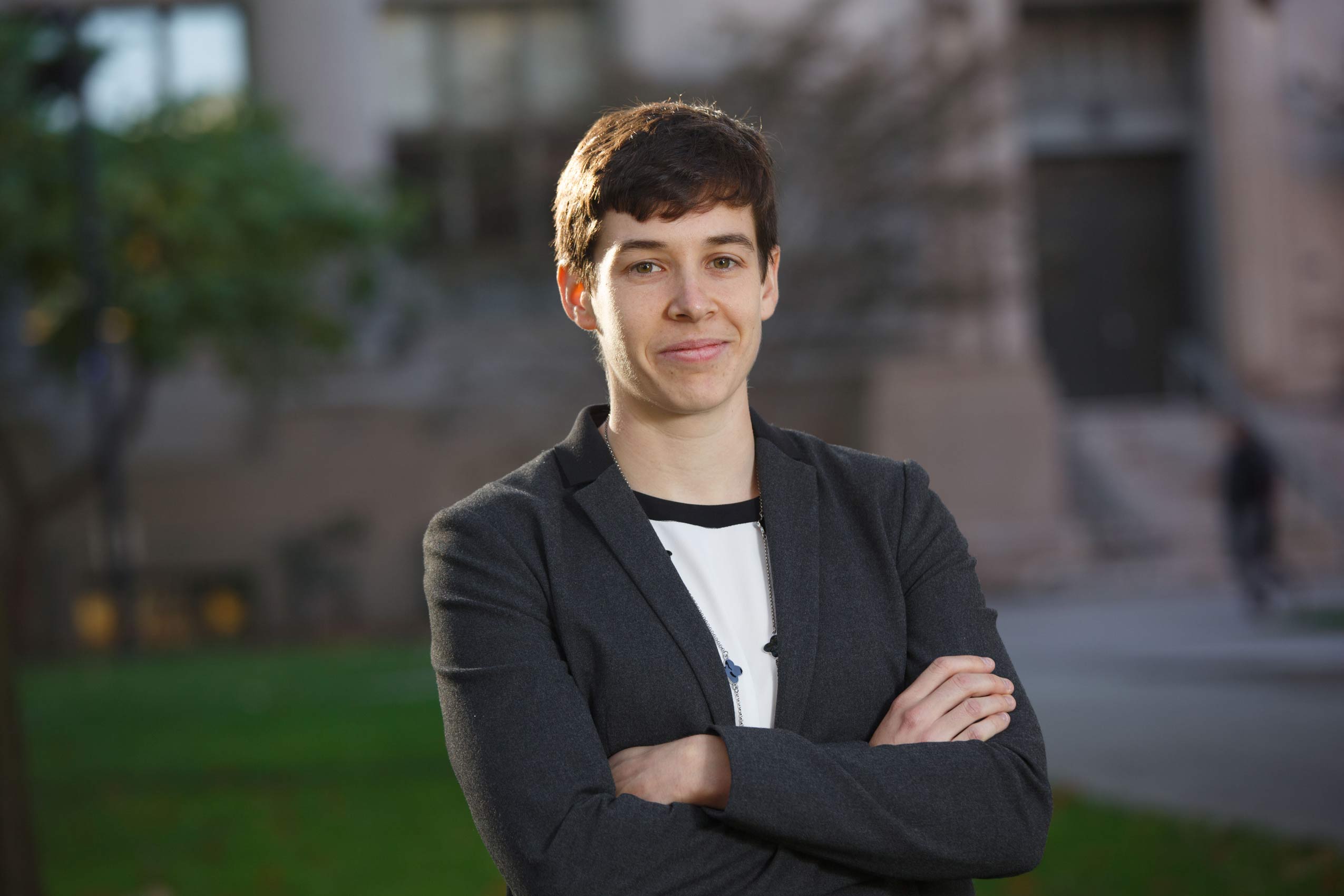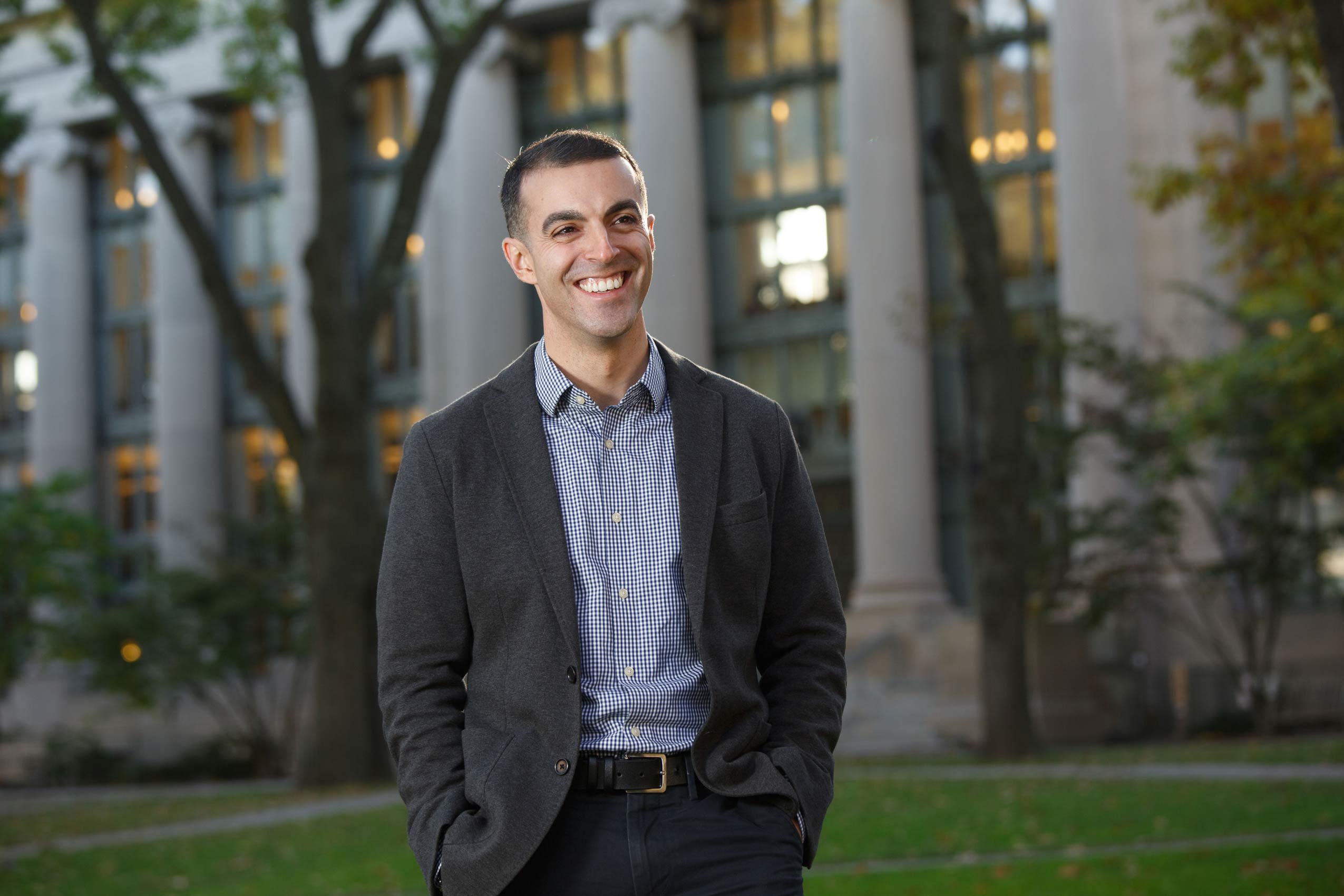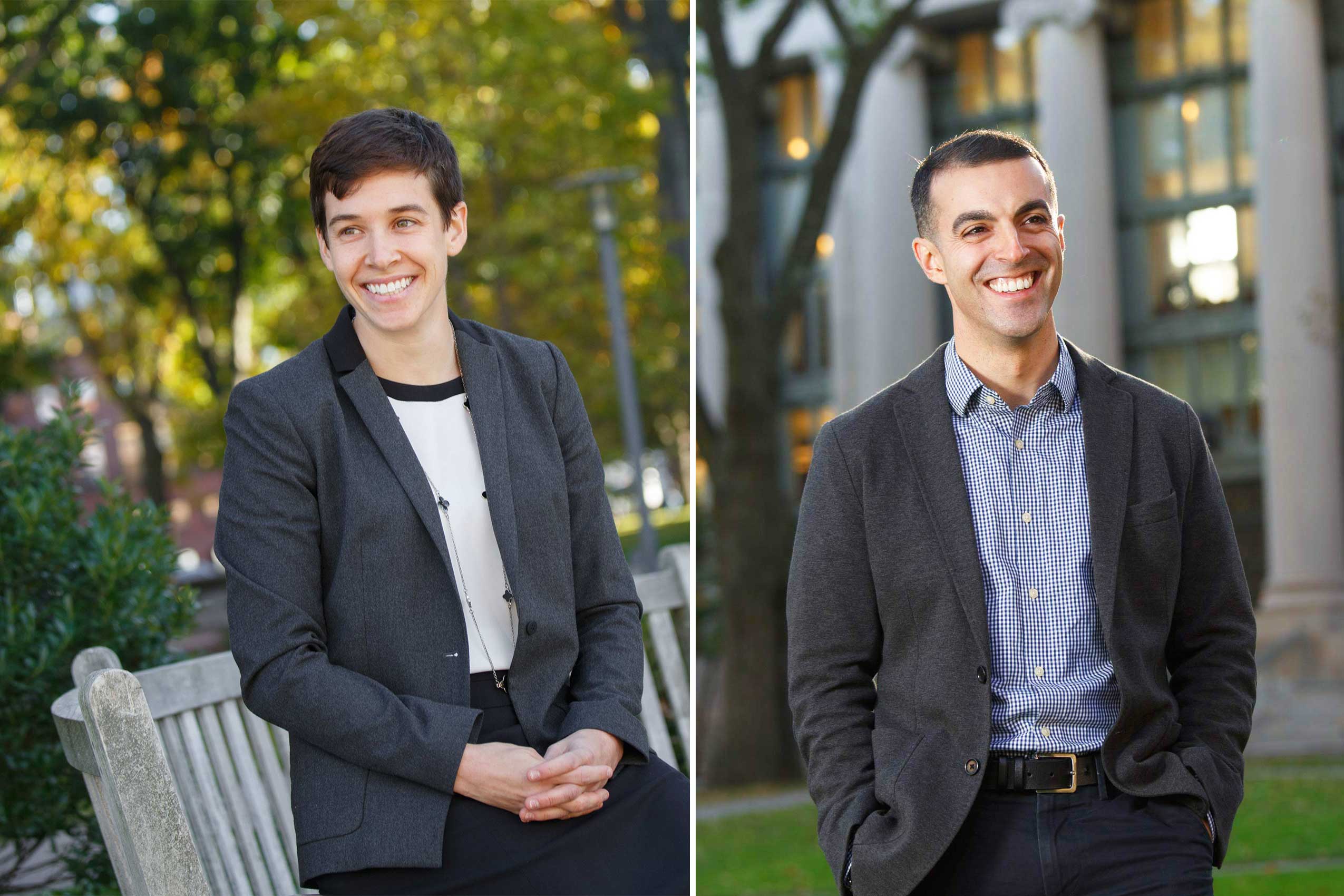With Veterans Day approaching, Harvard Law Today presents the following profiles of two current students, both Marines balancing life and service.
Sarah Grant ’19: ‘I looked at the Marines and I saw the kind of person I wanted to be.’
By Brett Milano

As a first-year Harvard Law student and a captain in the U.S. Marines, Sarah Grant has a unique perspective on her legal studies: No matter how heavy the courses may get or how many sleepless nights are involved, she’s already seen tougher challenges.
“I think every vet will tell you the same thing, that our standards for what’s hard and worth stressing over are very different,” she says. “The military desensitizes you in a lot of ways, and that’s been helpful. We’re used to working in demanding situations, with much higher stakes than ‘Did I understand my reading for today?’ You gain resilience and a sense of direction, and I came in with a good sense of what I’d like to learn in the next three years.”
Growing up in D.C., she developed a strong interest in public service. “Both my parents were lawyers and I grew up, quite frankly, with great privilege. I could really have done anything I wanted, and I wanted to push outside of my comfort zone.” She began her higher education at the U.S. Naval Academy in Annapolis, where her passion for international relations took off. She was named a Harry S. Truman Scholar her junior year and it was also at the Academy that she resolved to become a Marine. “At the Academy we go through a professional training curriculum, where the officers teach us to become military leaders. I was looking for an environment where I would be the most challenged. And you can’t really ask for much more than to be around professional, disciplined, passionate people every day. That was primarily what did it: I looked at the Marines and I saw the kind of person I wanted to be.”
Before joining the Marines she spent 2011-12 as a Fulbright scholar at the University of Cambridge, earning a Master of Philosophy in international relations. Her thesis was on the U.S- Philippines defense relationship, a subject that still fascinates her. “We had US troops stationed in the Philippines for nearly a century after the Spanish-American War, until 1991. At that point, there was significant political opposition to continuing U.S. presence and we couldn’t reach an agreement to maintain our bases, so we left. But then we started working together on counterterrorism operations after 9/11 and our level of engagement continuously expanded until a couple of months ago, when their newly-elected President announced he was cancelling our future joint exercises.”
The Philippines was one of the countries where she was deployed as a Marine. But her main base for three years was Okinawa, Japan working all-source intelligence—a realm that may sound mysterious to civilians. “Every military force has priorities for what it cares about in each region. In Asia that involves maintaining stability in the South China Sea, and with North/South Korea relations. That involves a lot of bilateral and multilateral exercises with our foreign partners out there. On a day to day basis it’s looking at the region as a whole, looking at what the sources of instability are and could potentially be.”
Humanitarian assistance and disaster relief were also a major component of her work, since southeast Asia is vulnerable to typhoons. And sometimes she worked alongside Navy personnel who were on the same mission. “Often you’re working with host nation governments to figure out where to bring food and water to people. Generally, the role of intelligence personnel is to take in all of the information from that environment, sort through it and see what matters. It’s very much intellectual work, which is why I was drawn to it.”
She admits that working in Asia isn’t the sort of thing Marines are normally known for, since the wars in Iraq or Afghanistan have been the main mission for a while, but it’s every bit as important. And as a Marine, she was fully trained to be deployed for combat. “You’re not under fire, but you’re prepared to be if it comes to that. And knowing how we’ll work with our partner forces is absolutely crucial to maintaining stability in the Pacific.”
Many of us have heard the rumor that Marines experience drowning as part of their training, and she confirms that she went through something like it. “The Water Survival Instructor course was the hardest thing I’ve done at any point, because you basically learn to drown and not panic. You’re in a pool in your uniform, but you also have a flak jacket and a Kevlar helmet on, and a prop rifle. You have to help another person who’s struggling, in this case I’m 130 pounds and the other person was 180. What I got from that was that I did panic a couple of times. And you have to learn to psychologically detach, because the other person will be panicking and you have to try to calm them down.”
She remains a captain in the Marine reserves, and last summer she did an internship with Vice President Joe Biden. Currently she feels that her studies at Harvard could lead to a career in government work. “This is subject to change of course, but I’d like to work somewhere in the national security space. I’m also developing an interest in criminal law, possibly prosecutorial work. There are also places where those overlap, like counterterrorism.”
Meanwhile, her military background is proving an advantage at Harvard. “One of the first things they warn you about is that a thousand things go on every day. You need to make sure you’re learning what you need, and that you’re also building relationships and friendships. The military teaches you how to prioritize.”
***
Tony Garofano LL.M. ’17: An Accidental Marine
By Lewis Rice

Most Americans may not yearn for the chance to work in a sparsely populated area of Afghanistan where danger could arise at any turn. But most Americans are not Marines. So when Marine Corps Major Anthony “Tony” Garofano LL.M. ’17 learned that he was deploying out to Helmand Province in 2010 to become a battalion judge advocate, his first reaction was that it was exactly where he wanted to be.
“I was legitimately excited for the opportunity I had,” he said. “When you join the Marine Corps or any other institution like that, you want to be part of what the main effort is. I was aware it wasn’t going to be a holiday or vacation but [thought] finally here is the chance to do the heart and soul of what our institution exists for.”
He expects to graduate from Harvard Law next spring with his LL.M., a career officer whose service has taken him from a base in California, to a war zone, to Capitol Hill, and to a return stint as a law student. At the same time, Garofano acknowledges that in many ways he is an accidental Marine – and an accidental attorney – who has not planned for a lot that has happened in his life so far but has embraced each surprising step.
Garofano had no aspirations to join the military as a student at Middlebury College in Vermont, where he was a classics major who would finish with the highest GPA in his department and captain the track team. During his sophomore year, a recruiter emailed all the school’s varsity athletes about attending the Marine Corps’ Officer Candidates School for its summer session. It was the month after September 11, 2001, and although the patriotic atmosphere of the time may have helped sway him, just as much, he said, was the fact that he didn’t have a summer job lined up and it seemed like it could be an interesting experience.
And was it ever. He recalls being shocked that students got yelled at the first time they had lunch. Students worked from 5 a.m. to 10 p.m. and any infraction required them to write an essay outside that time of exactly 300 words – and underline and number every word (Garofano had to write two essays when he neglected to cut his fingernails).
“Overcoming that challenge was really satisfying,” he said. “And to a certain extent it’s the hardest thing I’ve ever done, and it makes the rest of your life seem relatively easy.”
Garofano went back to OCS again the next summer and was commissioned an officer the day before he graduated from Middlebury. He hadn’t considered law school until a recruiter mentioned that the Marine Corps could choose any occupational specialty for officers but those who went to law school would be guaranteed to be attorneys. So he attended Catholic University’s law school and after a brief stint at a firm while awaiting active duty, he became a military prosecutor stationed at Camp Pendleton.
His cases included a drug distribution ring and a conspiracy to steal personal effects of Marines killed in Afghanistan. But he also has handled less serious offenses than a civilian prosecutor would.
“Our system has very different goals,” said Garofano. “It’s not just about protecting the community or broader notions of justice. It’s also about good order and discipline in the unit. So that extends to the lowest level crime.”
While in Afghanistan for nearly a year, he worked with local officials to improve conviction rates for detainees being prosecuted by Afghan courts. He also advised commanders on rules of engagement and minimizing civilian casualties during battalion operations. Taking part in the operations, which included his command post taking fire, was a highlight of his military career, the “esprit de corps” that Marines are known for no more evident than at that time.
An officer and friend with whom he served in Afghanistan told Garofano about another opportunity he hadn’t known about, the Marine Corps Congressional Fellowship Program. He won the fellowship, working in the office of Rep. Darrell Issa. He later served as a Marine Corps Legislative Liaison, educating congressional members about and advocating for Marine programs.
The Marine Corps encourages its mid-career attorneys to pursue LL.M degrees, and Garofano was happy for the opportunity to refresh his legal skills at HLS, focusing on criminal law classes with some international law. With nearly all of his LL.M. classmates being international students, he’s enjoying meeting people from different cultures and with different perspectives, and sharing his own experiences with them.
He’s balancing school with family time: his wife and 2-year-old daughter came with him to Cambridge. After he gets out of school, they’ll await the next place that the unpredictable life of military service takes them.
